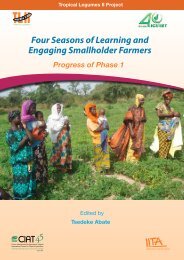Transgenic Groundnut - Icrisat
Transgenic Groundnut - Icrisat
Transgenic Groundnut - Icrisat
Create successful ePaper yourself
Turn your PDF publications into a flip-book with our unique Google optimized e-Paper software.
An ICRISAT Success Story<br />
<strong>Transgenic</strong> <strong>Groundnut</strong> – the World’s First<br />
The world’s first genetically modified groundnut –<br />
developed by ICRISAT – has reached the field<br />
trial stage. The new transgenic groundnut<br />
contains genes for resistance to the peanut clump<br />
virus (PCV), which is widespread in India and<br />
West Africa.<br />
The problem<br />
PCV is transmitted by Polymyxa gramminis,<br />
a soil-borne fungus that is difficult to control<br />
because it persists in the soil for several years.<br />
Suitable biocides are lacking, as are resistant<br />
groundnut genotypes. ICRISAT scientists<br />
screened over 10,000 germplasm accessions but<br />
found no sources of resistance.<br />
The answer was biotechnology. ICRISAT<br />
scientists developed protocols for genetically<br />
transforming groundnut with resistance genes<br />
introduced from the virus itself. Such genes, when<br />
stably expressed and inherited, can form an<br />
important germplasm source. Plant breeders can<br />
transfer resistance from this new germplasm into<br />
other adapted germplasm by using conventional<br />
plant breeding methods.<br />
Bare patches, stunted plants – peanut clump virus can<br />
cause large-scale losses on farmers’ fields.<br />
New science<br />
The biotech work involved four stages.<br />
• Gene sequencing and cloning was done by<br />
ICRISAT in collaboration with SCRI.<br />
• The coat protein (cp) and replicase genes of<br />
Indian peanut clump virus (IPCV) were<br />
transferred into economically important<br />
groundnut cultivars. This was done through<br />
Agrobacterium tumefaciens-mediated genetic<br />
transformation.<br />
• Extensive molecular characterization of the<br />
transgenics for gene integration, function, and<br />
inheritance was undertaken.<br />
• Field trials are in progress under controlled<br />
conditions to test the response of transgenic<br />
groundnut to the peanut clump disease, with<br />
permission from the Government of India.<br />
Introduction of genes by using<br />
cotyledon explants.<br />
<strong>Transgenic</strong> groundnut plant<br />
containing IPCV coat protein gene.<br />
Molecular<br />
analysis of<br />
genomic<br />
DNA from<br />
transgenic<br />
groundnut<br />
plants.
Contained field testing of transgenic<br />
peanuts<br />
Several T3 transgenic lines carrying either the cp<br />
or replicase gene were first tested at ICRISAT,<br />
Patancheru under contained conditions during the<br />
rainy season of 2002 with very encouraging<br />
results. Some of the selected lines showed<br />
normal growth and total virus elimination. New<br />
trials to further validate the results have been<br />
initiated in 2003. Subject to permission from host<br />
country governments, the selected transgenic<br />
lines will also be tested in open field trials in India<br />
against various Indian isolates, and in West<br />
African locations against the African isolate of<br />
PCV.<br />
Uninfected and infected (arrow) plants of groundnut.<br />
The benefits<br />
ICRISAT aims to harness the power of modern<br />
biotechnology to improve crop productivity and<br />
alleviate rural poverty. The new transgenic<br />
groundnut varieties will do both. Yield losses of up<br />
to US$38 million globally due to the peanut clump<br />
disease can be eliminated or largely reduced. And<br />
smallholder farmers in PCV-endemic areas will<br />
see their incomes rise dramatically. Moreover, the<br />
transgenic groundnuts resistant to the viruses will<br />
also ensure health safety by providing virus-free<br />
produce.<br />
Field trial for IPCV resistance at ICRISAT Patancheru.<br />
Partner<br />
• Scottish Crop Research Institute<br />
(SCRI), Dundee, UK<br />
Donor<br />
• Department for International<br />
Development (DFID), UK<br />
For further information, contact KK Sharma, Senior Scientist, ICRISAT<br />
k.sharma@cgiar.org<br />
International Crops Research Institute for the Semi-Arid Tropics<br />
Patancheru-502 324, Andhra Pradesh, India<br />
www.icrisat.org<br />
SS11-Aug 03
















